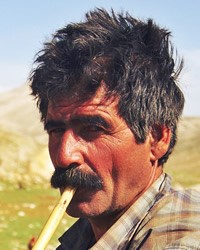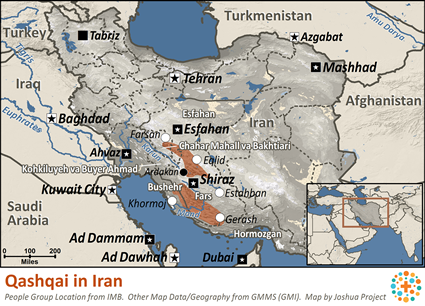We know very little about the history of the Qashqai except that they left central Asia in the 11th century AD and began entering Iran. Nothing else is recorded about them until the mid-18th century when the ruler of southern Iran appointed a Qashqai as the tribal leader of a province.
The Qashqai (pronounced KASH-kai) are a nomadic people who roam across the harsh deserts of southwest Iran. Although they are made up of many different linguistic, cultural, and tribal origins, they all call themselves "Turks." Qashqai Turki, their spoken language, does not yet exist in written form; most of them communicate in the Farsi language instead.
Traditionally the Qashqai were nomadic herders. This is becoming less the case. Since the 1960s Iranian governments have tried to get them to live sedentary lives. Many still migrate with their herds two times a year; once to get to cooler climates in the mountains, and the other time to find pasturelands in lower elevations.
Although Qashqai women have little freedom, they take the lead in certain family matters. For example, women are responsible for arranging marriages. They are probably best known, though, for their expert weaving skills.
Islam is the state religion of Iran, and virtually all Qashqai profess to be Shia Muslims. In reality, however, they have very little contact with Islamic institutions or devout Muslims; they simply use Islam for its political advantages. Very few observe daily prayers, and they do not fast during Ramadan (the ninth month of the Muslim calendar in which all Muslims are expected to fast and pray). They do, however, follow Muslim traditions during the rites of marriage and death.
As a remote herding people, the Qashqai are not affected by the government as much as many other ethnic groups in Iran. It means less government interference, but it also means they lack adequate schools and medical facilities. Also because of their remoteness, they have little chance to hear of the lifesaving gospel.
Pray for God to send Qashqai family leaders dreams of the living and righteous Christ, opening entire families to his salvation and lordship.
Pray for audio Christian materials to make their way into Qashqai families.
Pray that God will raise up laborers who understand the Muslim culture and who can effectively take the gospel to them.
Scripture Prayers for the Qashqai, Kashkai in Iran.
https://en.wikipedia.org/wiki/Qashqai_people
| Profile Source: Joshua Project |

























